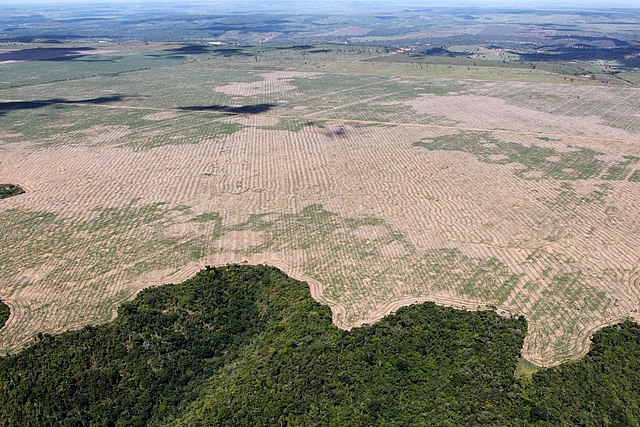 In mid-December, six supermarkets announced a joint decision to stop selling beef sourced from Brazil. The reason: the beef products were from cattle that were raised in illegally deforested areas.
In mid-December, six supermarkets announced a joint decision to stop selling beef sourced from Brazil. The reason: the beef products were from cattle that were raised in illegally deforested areas.
The same company that was responsible for beef products -- JBS, is also linked to leather sold to companies that manufacture handbags and shoes.
Deforestation, or the intentional cutting down of trees, was recognized as a major issue at the recent COP26 climate summit. Over 100 world leaders pledged together to end and reverse deforestation by 2030. Additionally, the governments of 28 nations agreed to eliminate deforestation from international trade as well as some agricultural goods.
Why is deforestation a concern?
 Trees absorb carbon dioxide and emit oxygen through a process called photosynthesis which allows plants to convert energy from sunlight into food that they can use.
Trees absorb carbon dioxide and emit oxygen through a process called photosynthesis which allows plants to convert energy from sunlight into food that they can use.
This process is important because it reduces the levels of carbon dioxide in the atmosphere. Carbon dioxide is a greenhouse gas. Greenhouse gases trap heat and radiation resulting in an increase in our Earth's temperature and worsening climate change.
Elizabeth Wathuti is an environmentalist and climate activist from Kenya. At the COP26 event, she shared her strong connection to forests from a young age which began when she planted a tree at age 7. She now passes the love of nature down to children at local schools, organizing for them to plant fruit trees together, and waiting for the trees to mature. Wathuti explained that it is important for trees to grow until they mature so they can absorb carbon dioxide.
Sandy Knapp, a botanist for the Natural History Museum, spoke of each tree as a living organism, and each forest as an ecosystem teeming with life. Unfortunately, one-third of the world’s forest has been lost since the last ice age. It is crucial that reforestation happens to protect the remaining forests. This is a challenging task–in order for trees to survive, people must tend to the tree every couple of months to ensure its survival. Trees also require a lot of water, which is an issue with changing rainfall patterns as a result of climate change.
The Role Of Companies
Businesses are a primary source of deforestation. At COP26, over 30 of the world’s biggest corporations have committed to stopping investments in deforestation-related operations.
Grant Reid, the CEO of Mars, spoke at an event during the conference and pledged that his company Mars Incorporated will cut its greenhouse gas emissions by 27% by 2025. His company also has cut down their palm oil suppliers from 1500 to 90 to ensure they do not have deforestation in their supply chain. Palm oil plantations are linked to deforestation in many parts of southeast Asia. Reid believes that businesses can be successful while helping the environment by using the right suppliers to grow crops and by using regenerative agricultural techniques.
Robin Millington, CEO of Planet Tracker spoke of the need for regulations to enforce that the actions happen. She suggested that there should be regulatory frameworks. An example of this could be that companies can only list on the stock market if they prove they are not deforesting in their supply chain.
While some experts are skeptical about how effective a deforestation pledge will be, everyone still agrees it is a crucial step in combating climate change.
Sources: Guardian, NY Times COP26, BBC







